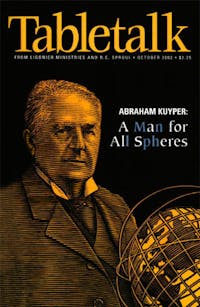
Request your free, three-month trial to Tabletalk magazine. You’ll receive the print issue monthly and gain immediate digital access to decades of archives. This trial is risk-free. No credit card required.
Try Tabletalk NowAlready receive Tabletalk magazine every month?
Verify your email address to gain unlimited access.
Abraham Kuyper’s vision of a church committed to the Lordship of Jesus Christ in all things is a message that needs to be recovered and proclaimed with zeal in every pulpit and professorial chair available to us.
Unlike Kuyper’s life-encompassing Lordship doctrine, the church today practically restricts the concept of Christ’s Lordship to matters of personal salvation, sometimes moving beyond spiritual experience to ecclesiastical order and discipline. While submission to Christ’s Lordship begins there, Kuyper taught us that it extends much farther. Its scope is global, extending from theology to the arts, from politics to science, from individuals to institutions. Serving Jesus necessarily entails submission to His Lordship in all areas of human thought and activity. It involves nothing less than the fulfillment of the Old Testament dominion mandate within the New Testament framework of Christian discipleship.
Given the spiritual malaise and broad-mindedness of many professing Christians, this is a daunting task. Nevertheless, the Christian pastor is endowed by the reigning Christ with the spiritual tools for progress if he will but use his high office to promote this glorious calling. God raised up Abraham Kuyper to show us the way.
Among Kuyper’s many relevant ideas, the following call for careful consideration:
First, preaching must insist upon the cosmic Lordship of Jesus Christ. This is more than a peripheral theme, a second blessing for the committed, or a spiritual idea lacking concrete significance. Submission to Christ’s Lordship must permeate the life and message of the Christian pastor. In the spiritual and ethical sphere, Christ’s law, the inspired Scriptures of the Old and New Testaments, must be proclaimed in all its detail and relevance as the all-sufficient standard for Christian thinking and living. Beyond this fundamental application, Christ’s Lordship must be proclaimed in all its life-embracing power, from a man’s daily vocation to his yearly vacation. Union and communion with Jesus necessarily involves and produces obedience to His all-sufficient Word as the foundation and guide of a truly blessed and useful life. His reign at the Father’s right hand is that total; His discipleship program is that comprehensive. Anything short of this agenda fails to reckon adequately with the Scriptural data.
Second, preaching and the pastoral ministry must bring the theoretical down to the level of the practical. A clear proclamation of Christ’s Lordship must be coupled with practical instructions on how His Word speaks to the whole realm of human knowledge, relationships, and activities. For the pastor, this calls for a life dedicated to the study of Scripture and a mind exercised in the working out of its principles. It requires preaching that is expository and application that extends past the personal to the whole economy of life. Unfortunately, most sermons, theological treatises, and monographs never make it out of the transcendental realm of first principles. Those that do often lose touch with a specifically Christian world-view, choosing instead to borrow from the popular principles espoused by the supposed experts and pundits of our culture.
Third, the church must recommit herself to a philosophia Christiana. Like all reformers, Kuyper understood that the Sunday morning sermon is insufficient to train God’s people unto godliness. Believers must possess a Christian philosophy of life, one that interacts with the full range of biblical teaching and is applied comprehensively. The church must pursue educational venues that are wholly committed to the principle of training God’s people in the full implications of God’s covenant. Unbelieving and nominally Christian institutions pursue other ends, and we may not entrust our spiritual well-being and the future of the church to them. Many pastors are unwilling to fight this battle in the United States. By their silence, they encourage believing parents to settle for the common grace crumbs that may or may not fall from the table of pluralistic education. Such a practice denies the Lordship of Christ and compromises the full spiritual training of Christ’s covenant children.
Fourth, the church must reject the modern pluralistic spirit. Kuyper’s cultural battle was against the modernists, but his principles are equally applicable to our conflict with the pluralists, for pluralism is the logical terminus of modernism’s anti-Christian foundations. Pluralism maintains that since no single worldview possesses absolute truth and universal significance, each particular worldview must cooperate amicably and tolerantly within the marketplace of ideas. While we recognize that a plethora of worldview options exists in our culture, we must firmly reject the relativistic assumptions of pluralism. Christ’s gospel is intrinsically absolutistic and, yes, even intolerant. It calls upon men to repent of their worldview as well as their personal sins. While it gladly listens to other opinions and practices charity toward all men, it is committed to the destruction of every philosophy that opposes the revelation of God in Jesus Christ. Therefore, the gospel will come into conflict with any culture that rejects the gospel, even one as professedly open as our own. Moreover, the church cannot hope to secure her liberties by bowing to this modern god any more than the first-century believers could confess “Caesar is Lord,” hoping thereby to retain the right to practice their faith privately. They had to confess “Jesus is Lord” and face the social and civil consequences.
May the glorious reign of our Lord Jesus result in the greater submission of the church to His authority, and, by His Word and Spirit, bring this culture to the foot of His throne in faith and repentance.
